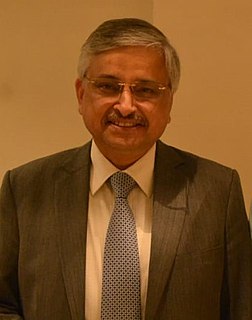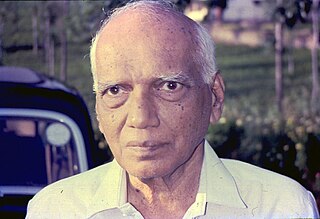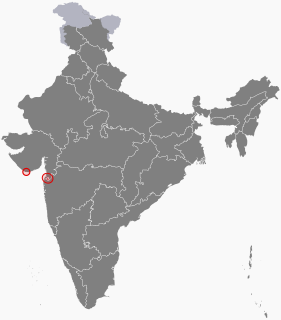
Daman and Diu was a former union territory in northwestern India. With an area of 112 km2 (43 sq mi), it was the smallest administrative subdivision of India on the mainland. The territory comprised two districts, Damaon and Dio island, geographically separated by the Gulf of Khambat. The state of Gujarat and the Arabian Sea bordered the territory. A Portuguese colony since the 1500s, the territories were taken by India with the Annexation of Goa in 1961. Daman and Diu were administered as part of the union territory of Goa, Daman and Diu between 1961 and 1987, after the Goa Opinion Poll they became a separate union territory. In 2019, legislation was passed to merge the union territory of Daman and Diu with its neighbouring union territory, Dadra and Nagar Haveli, to form the new union territory of Dadra and Nagar Haveli and Daman and Diu with effect from 26 January 2020.

Sirkazhi G. Sivachidambaram is a Carnatic music vocalist and cinema playback singer from Chennai.
Jasbir Singh Bajaj was an Indian physician and diabetologist. He was awarded the Padma Vibhushan, India's second-highest civilian award, for his outstanding contribution to the medical sciences and research, and his efforts to improve the healthcare delivery system. Earlier he was decorated with the Padma Shri in 1981 and the Padma Bhushan in 1982. He was the ninth person in the country to receive the award for services in the field of medicine and research.

Hakim Syed Khaleefathullah is an Indian physician and the founder of Niamath Science Academy, known for his scholarship and expertise in the alternative medicine system of Unani. He was honoured by the Government of India, in 2014, with the Padma Shri, the fourth highest Indian civilian award, for his contribution to the field of medicine.
Rajendra Achyut Badwe, is an Indian medical doctor and surgical oncologist. He was honoured by the Government of India, in 2013, by bestowing on him the Padma Shri, the fourth highest civilian award, for his contributions to the field of medicine.

Gulshan Rai Khatri was an Indian medical doctor and public health specialist, known for his efforts in curbing the disease of tuberculosis worldwide. He was honoured by the Government of India, in 2013, by bestowing on him the Padma Shri, the fourth highest civilian award, for his contributions to the fields of medicine and medical education. In 2018, he was diagnosed with multiple myeloma, a form of blood cancer and after a long array of health problems, he succumbed to a heart and lung seizure on July 16, 2020.
Ganesh Kumar Mani is an Indian cardiothoracic and vascular surgeon, reported to have performed over 20,500 Coronary artery bypass surgeries. He was honoured by the Government of India, in 2013, by bestowing on him the Padma Shri, the fourth highest civilian award, for his contributions to the fields of medicine and medical education.
Dr. Jitendra Kumar Singh is an Indian oncologist, the ex director of Mahavir Cancer Institute & Research Centre and the president of Cancer Care India, the apex body for cancer support organisations in India. He was honoured by the Government of India, in 2012, with the fourth highest Indian civilian award of Padma Shri.
Jugal Kishore (1915–2012) was an Indian homoeopathic physician and the founder Director of Nehru Homoeopathic Medical College and Hospital, New Delhi, a Government of Delhi undertaking. He was honored by the Government of India, in 2012, with the fourth highest Indian civilian award of Padma Shri.

Sarungbam Bimola Kumari Devi is an Indian medical doctor and the Chief Medical Officer of Imphal west region in the Indian state of Manipur. She has been serving in the Manipur state medical service since 1979, mostly working in the rural areas and has headed the food safety office during two visits of Narendra Modi, the Prime Minister of India, to the state. Kumari, a recipient of the 2014 Dr. B. R. Ambedkar International Award, was honoured by the Government of India in 2015 with the Padma Shri, the fourth highest Indian civilian award.

Randeep Guleria is an Indian pulmonologist and the current director of the All India Institute of Medical Sciences, New Delhi, credited with the establishment of India's first centre for pulmonary medicines and sleep disorders at AIIMS. He was honoured by the Government of India in 2015 with Padma Shri, the fourth highest Indian civilian award. He is a part of India's COVID-19 response effort.

Natteri Veeraraghavan (1913-2004) was an Indian physician, microbiologist and medical researcher, known for his contributions to the understanding of diseases like rabies, tuberculosis and leprosy. He was a former director of the Pasteur Institute of India, Coonoor and the chairman of the World Health Organization International Reference Center on Rabies. He was honoured by the Government of India in 1967, with the award of Padma Shri, the fourth highest Indian civilian award for his contributions to the society.
Krishnaswami Srinivas Sanjivi (1903–1994) was an Indian medical doctor, Gandhian, social worker and the founder of Voluntary Health Services (VHS), a medical facility in Chennai reported to be serving the lower and middle-class people of the society. He was honoured by the Government of India in 1971 with Padma Shri, the fourth highest Indian civilian award. Five years later, the government followed it up by awarding him the third highest civilian award of Padma Bhushan in 1976.
Mani Kumar Chetri is an Indian cardiologist, a former director of West Bengal State Health Services and a former director of the IPGMER and SSKM Hospital, Kolkata. He is an elected fellow of the National Academy of Medical Sciences and a recipient of the fourth highest Indian civilian award of Padma Shri from the Government of India in 1974.

Tsering Landol is an Indian gynecologist and one of the pioneers of women's health in the Ladakh Union Territory of India. She served at the Sonam Norboo Memorial Government Hospital, Leh and is also associated with other educational institutions. The Government of India awarded her the fourth highest civilian honour of the Padma Shri, in 2006, and Padma Bhusan in 2020 for her contributions to Indian medicine, making her one of the few woman recipients of the award from Jammu and Kashmir and the first Ladakhi woman doctor to receive the honour. She is also featured on the 'Wall of Fame' which features those who have exhibited excellence throughout their career or existence have exemplified glory and greatness. The Wall recognizes those individuals and teams which have attained high achievement and/or made a significant contribution to society. Landol is featured in The Song Collector, a documentary film on the life of the renowned Ladakhi folk musician, Morup Namgyal. She was awarded Padma Bhushan, the third highest civilian award in India in the year 2020.

Mohsin Wali is an Indian cardiologist and a former honorary physician to R. Venkataraman and Shankar Dayal Sharma and the serving physician to Pranab Mukherjee. His first assignment as a physician to the President of India was with R. Venkataraman, at the age of 33, making him the youngest physician to serve an Indian President. He is the only physician to have served three Presidents of India. The Government of India awarded him the fourth highest civilian honour of the Padma Shri, in 2007, for his contributions to Indian medicine.
Thoguluva Shesadri Chandrasekar is an Indian gastroenterologist and the founder chairman of Medindia Hospitals, a healthcare facility based in Chennai. He is credited with the performance of over 23,000 endoscopy procedures and is known for the Braille chart on personal hygiene he prepared in 2015 for the visually impaired people. The Government of India awarded him the fourth highest civilian honour of the Padma Shri, in 2016, for his contributions to medicine.

Shri Vinoba Bhave Civil Hospital (VBCH) is a government multi-speciality hospital located in Silvassa, Dadra and Nagar Haveli, India.

Dadra and Nagar Haveli and Daman and Diu is a union territory in India. The territory was constituted through the merger of the former territories of Dadra and Nagar Haveli and Daman and Diu. Plans for the proposed merger were announced by the Government of India in July 2019, the necessary legislation was passed in the Parliament of India in December 2019 and came into effect on 26 January 2020. The territory is made up of four separate geographical entities: Dadra, Nagar Haveli, Daman, and the island of Diu. All four areas were part of Portuguese Goa and Damaon with the former joint capital in Panjim, they came under Indian rule in the mid-20th century after the Annexation of Goa. These were jointly administered as Goa, Daman and Diu until 1987, when Goa was granted statehood after the Konkani language agitation. The current capital city is Daman.

The first elections to the Goa, Daman & Diu Legislative Assembly were held in December 1963, to elect members of the 30 constituencies, in the Union territory of Goa, Daman and Diu, India.











